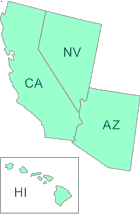Contact Pacific Southwest Waste Program
Pacific Southwest, Region 9
Serving: Arizona, California, Hawaii, Nevada, Pacific Islands, Tribal Nations
Solid Waste
Household Hazardous Waste
Additional Resources
While industrial facilities may use and dispose of potentially hazardous substances, so do households. Household waste may come from single or multiple family dwellings, hotels and motels, and other types of residences. Because of the waste substances' chemical nature, they can poison, corrode, explode, or ignite easily when handled improperly. When discarded, they are considered "household hazardous waste."
Frequently Asked Questions, on this page
- What are the dangers of improper disposal of household hazardous waste?
- What are examples of potential household hazardous wastes?
- What are some alternatives for some common hazardous household products?
- Did you know....??
- Are there any regulations for household hazardous waste?
- What can you do to reduce household hazardous waste risks?
- How can I get additional information about household hazardous waste?
What are the dangers of improper disposal of household hazardous waste?
Household hazardous wastes are sometimes disposed of improperly by individuals pouring wastes down the drain, on the ground, into storm sewers, or putting them out with the trash. The dangers of such disposal methods may not be immediately obvious, but certain types of household hazardous waste have the potential to:
- cause physical injury to sanitation workers
- contaminate septic tanks or wastewater treatment systems if poured down drains or toilets
- pollute bodies of water if poured into storm sewers
- present hazards to children and pets if left around the house
- contaminate ground water and surface water that is used as a source of drinking water if sent to unprotected landfills
What are examples of potential household hazardous wastes?
- Adhesives
- Latex and oil-based paints
- Paint thinners and strippers
- Grease and rust solvents
- Wood and metal cleaners
- Nail polish and removers
- Cosmetics
- Household polishes and cleaners
- Oven cleaners
- Drain openers
Did you know....??
Each person in the United States produces an average of 4 pounds of household hazardous waste each year for a total of about 530,000 tons/year.
The average U.S. household generates more than 20 pounds of household hazardous waste per year. As much as 100 pounds can accumulate in the home, often remaining there until the residents move out or do an extensive cleanout.
Are there any regulations for household hazardous waste?
Federal Regulations
Households often generate solid wastes that could technically be hazardous wastes (e.g., old solvents, paints, pesticides, fertilizer, poisons). However, it would be impossible to regulate every house in the United States that occasionally threw away a can of paint thinner or a bottle of rat poison. Therefore, EPA developed the household waste exemption. Under this exemption, wastes generated by normal household activities (e.g., routine house and yard maintenance) are exempt from the definition of hazardous waste. EPA has expanded the exemption to include household-like areas, such as bunkhouses, ranger stations, crew quarters, campgrounds, picnic grounds, and day-use recreation areas. While household hazardous waste is exempt from Subtitle C it is regulated under Subtitle D* as a solid waste.
State Regulations
While households do not have to separate household hazardous waste from trash under federal law, some states have special requirements. Call local or state solid waste officials to learn what requirements apply to households or small businesses in your area. For state HHW information click on the state of your choice:
What can you do to reduce household hazardous waste risks?
Reduce by purchasing only the amount you need.
Reuse the products by donating unused portions to friends or community organizations.
Recycle leftover household hazardous products that are recyclable and dispose of the others safely by participating in your local household hazardous waste collection program. If you have used motor oil or batteries, take them to collection sites. Contact your city or county's environmental health, solid waste, or public works department for information regarding which wastes can be recycled in your area.
Never leave household hazardous products or wastes within reach of children or pets. When possible, buy products with less harmful ingredients (read the labels) or buy nonhazardous alternatives* to hazardous products. When using a product, read and follow the label directions, never mix it with other products, and use it up entirely. Do not dispose of household hazardous wastes in the trash, on the ground, or in storm or sewer drains. Do not remove product labels, and do not remove products from their original containers.
For additional information about safe disposal methods, contact
the National Recycling Hotline at 1-800-CLEANUP (253-2687) or
visit their Web site. ![]()
How can I get additional information about household hazardous waste?
Web sites
1-800-CLEANUP: Household Hazardous Waste
California Department of Toxic Substances Control
CalRecycle (California Department of Resources Recycling and Recovery)
Contacts
National Recycling Hotline
1-800-CLEANUP
California:
CalRecycle (California Department of Resources Recycling and Recovery)
(916) 341-6690
Department of Toxic Substances Control
Sara Scott
(916) 324-3159
Hawaii:
Hawaii Department of Health
Solid and Hazardous Waste Branch
Arizona:
Arizona Department of Environmental Quality
Mindi Cross (cross.mindi@azdeq.gov)
(602) 771-4673
Nevada:
Nevada Division of Environmental Protection
Ed Glick (eglick@ndep.nv.gov)
(775) 687-9467
Publications
To order the following documents call: RCRA Information Hotline (800) 424-9346
Household Hazardous Waste Management: A Manual for One-Day Community Collection Programs.
Household Hazardous Waste: Steps to Safe Management. April 1993. EPA 530-F-92-031.
Household Hazardous Waste Reduction. August 1997. EPA-905-F-97-011.
Collecting Household Hazardous Wastes At Wastewater Treatment Plants: Case Studies (1990), publication number EPA 430/09-900~016, published by U.S. EPA, Office of Water (WH-546), 401 M Street SW, Washington, DC 20460.

